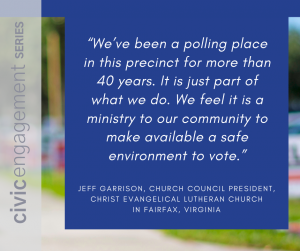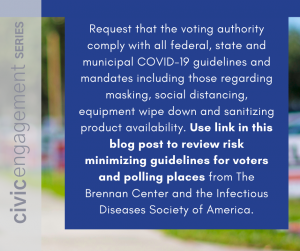According to data presented by the U.S. Election Assistance Commission, over 230,000 polling places were used in 2018. Less than 1% of those were located at election offices. Most were at schools, community centers… and churches.
The need
 Experience during primary elections in our nation have led some to conclude more polling places are needed before the November 3, 2020 general election. Myrna Perez, director of the voting rights and elections program at the Brennan Center for Justice at NYU School of Law, is quoted in an AP news article saying, “In the best of times, really long lines are deterring and disenfranchising. In the time of the coronavirus, long lines can be deadly.”
Experience during primary elections in our nation have led some to conclude more polling places are needed before the November 3, 2020 general election. Myrna Perez, director of the voting rights and elections program at the Brennan Center for Justice at NYU School of Law, is quoted in an AP news article saying, “In the best of times, really long lines are deterring and disenfranchising. In the time of the coronavirus, long lines can be deadly.”
Several ELCA congregations have opened their facilities as polling places in previous elections. Is this a way your congregation wants to steward its building in 2020? State laws govern where polling places can be located, but ELCA Legal and Risk Assessment colleagues also have some advice to share on churches serving as polling locations.
Some considerations
Before your church responds to a request or steps out to offer to be a polling place, key issues must be considered in addition to operating by COVID-19 guidelines and mandates: (1) accessibility, (2) security, and (3&4) insurance/liability.
(1) If the municipality uses the church as a polling place, it should be accessible. Officials should make an accessibility determination in the portion of the building and parking lot being used for voting. Additionally, it is always a good idea to inventory the property for safety hazards.
(2) If the church has a preschool, school or similar activity in the building that is still open, security steps must be taken to make sure that there is separation between the operating school and parts of the building accessible to the public. For example, voters may be directed to a specific door and part of the building but not be allowed access to the other portion. Some churches just close the school for election day (like many public schools do).
(3) Make sure the congregation’s insurance carrier is aware of the facility’s use as a polling place to assure coverage if something happens. The aforementioned safety hazards inventory of the area being made accessible to the public can be assuring.
(4) Proof of insurance for a location as a polling place should be available from the voting authority.
-
- Request that the voting authority provide the respective church with a current insurance certificate evidencing the following type of insurance and coverage.
Commercial General Liability:
(a) Bodily Injury and Property Damage Liability with a $1,000,000 limit per occurrence
(b) Personal and Advertising Liability with a $1,000,000 limit per person or organization
(c) Products and Completed operations with a $1,000,000 limit per occurrence and in the aggregate
(d) General aggregate with a $3,000,000 limit
-
- It is very important to confirm that the church is indicated as being insured on the certificate. This confirmation may look something like: (INSERT Name of Church) is named as an additional insured under the (INSERT Name of Voting Authority’s) commercial general liability policy.
 Uniquely this year, being a polling place means observing best practices in this time of pandemic. Request that the voting authority comply with all federal, state and municipal COVID-19 guidelines and mandates including those regarding masking, social distancing, equipment wipe down and sanitizing product availability. Guidelines to minimize the risk of transmitting COVID-19 at the polls are discussed in a joint release from The Brennan Center and the Infectious Diseases Society of America.
Uniquely this year, being a polling place means observing best practices in this time of pandemic. Request that the voting authority comply with all federal, state and municipal COVID-19 guidelines and mandates including those regarding masking, social distancing, equipment wipe down and sanitizing product availability. Guidelines to minimize the risk of transmitting COVID-19 at the polls are discussed in a joint release from The Brennan Center and the Infectious Diseases Society of America.
Taking the next step
“For Lutherans, one way Christian vocation finds expression is through dedicated, competent public service,” states the ELCA social message, “Government and Civic Engagement in the United States: Discipleship in a Democracy.” No voter should have to choose between their safety and their fundamental right to vote in November states BrennanCenter.org which shares the joint guidelines. The ELCAvotes initiative grew from the social policy resolution, “Voting Rights to All Citizens,” which calls on us to engage in local efforts and support legislation guaranteeing the right of all to vote. With planning and awareness of best practices, your congregation may be just the place to help facilitate democratic expression in your community and be of public service.
Contact your county Board of Elections to find out how to designate a place you are connected with as a polling site. The American Association of People with Disabilities also has tips on making this connection.
“We’ve been a polling place in this precinct for more than 40 years,” said Jeff Garrison, Church Council President of Christ Evangelical Lutheran Church in Fairfax, Virg. “It is just part of what we do. We feel it is a ministry to our community to make available a safe environment to vote.”
This text will soon be available as a pdf from ELCA.org/votes and ELCA.org/resources/advocacy.
